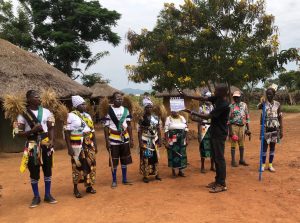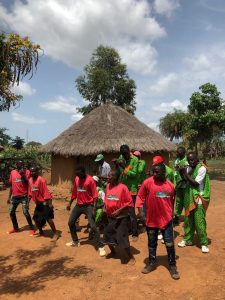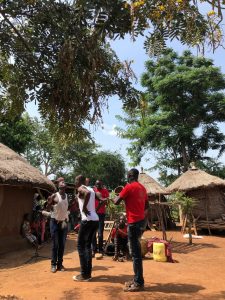We drove from the Kifa Hotel in Tarime and drove 50 kilometres to Buturi. Jackie was kind enough to let us record in her village at her mother’s home. We recorded three groups:
Group 1: Maisha Bora Suba Group: Our first group, from the Mara Regio (Roria District) was formed in 2012. They are from the Abhasimbete community. Their style is Rirandi and they play the Zeze/Endongwe (a one stringed instrument similar to the Kenyan Orutu and Ugandan Rigi Rigi), Rirandi (a giant horn, similar to the Uganda Big Wala, but made with 6 gourds, not one), Ekeborogo (flute), the Ekedomwa (drums), Ama’ghorro (huge leg shakers), and Firimbi (whistle).
They wore Amahunsho (grasses that are attached to the shoulders, and shake with their shoulders’ movement), Enyandusbi (beads) and the men carried Omuhiyo (wooden knife) and the woman carried Omughango (spoons). The leg shakers were amazing and we’ve never seen anything like them.

We recorded seven songs with them (follow links to Youtube):
- Mantho: About a man who was given money to walk to his destination. He had a long walk ahead of him, but funds were covered. To save time and money, however, he choose to walk through the river. Sadly, a crocodile attacked him and ate his legs. A cautionary tale about taking short cuts.
- Jackie Mosani Wethu: A traditional song of praise and thanks, which was sung for our host, Jackie.
- Thare Mushi Wakono Okwebora Kodhethre: a song about having kids and investing in your children.
- Ekethende kiranganya ni mburungo: a song about what happens when the river overflows. All the things from the river and along the edges of the river spreads through the village and around all the land
- Mahenne Gayo: A song about the importance of always telling the truth
- Mahenne Gayo: We repeated song 5 with ‘freestyle recording’ – what we mean here is we allow our three camera operators to ‘roam’ and to ‘release the band’ to dance. We are trying to overcome the somewhat artificial nature of ‘archiving’ where the band is constrained into a single shot.
- Magic Moment: We loved the percussion and wanted to capture this as magic moment.
Group 2: Upendo Jazz: The group is from the Murangi Village in the Mara Region and their community is Wajita and their style is Vidogori. They were founded in 1999. Their instruments included: Ngoma za Budogori (drums, with a kick) and Njiga (shakers from gourds).
It is worth taking a minute on the drums. They were typical African drums, but set up Western Style on a steel rack and they leaned one large bass drum against the rack. The drummer then built a separate wooden kick pedal, so he could play all the drums with his hands and kick with his feet. We had not seen this before and it meant the group has a very traditional sound but a very modern feel, with contemporary beats.

We recorded six songs with them:
- Omweko (about a drought that caused great hunger in the village in 2017)
- Majirani: about neighbours, where the band remembered times when all neighbours used to support one another
- Maria: A story about a woman that abandoned her kids
- Mazingira: a song about the environment and the need to protect the environment. Examples included stopping use of plastics and keeping your waste water away from your drinking water.
- Magic Moment: We recorded the beats of Majirani, percussion only
- Magic Moment: Majirani again to record slightly differently.
Group 3: Serengeti Group: This group, formed in 2016, was from the community of Kuria and played in the Ritungu style – this style refers to the form of dancing where the two lead dancers ‘nodded’ their head in almost a trance like way to the music and to their large eight-stringed instrument. We were mesmerized.
Their instruments included the: Zeze, Virandi (shakers), and Ritungu (eight stringed instrument, huge Nyatiti). The group had three musicians in ‘red’ and two dancers in ‘white.’ The dancers were performing a ‘head nodding’ dance which was hypnotic and was extremely unique. The athleticism of these dances were very similar to what we’ve seen in Uganda and very special.

We recorded five songs with them:
- Tunaupinga Ukeketaji: A song about stopping abuse of young women and FMG
- Vijana Wafanye Kazi: A song about respecting parents and respecting work
- Nyimbo Ya Kupongeza: A song of praise for Jackie, our host
- Serengeti Tuna Weza (praise song about Band itself) and Kwaheri amukeni tucheze tunaenda (good bye dance) – songs 4 and 5 song as one
- Freestyle: We then recorded the band in freestyle.
One observation from Day One: These groups have the energy and youth of many of the groups we recorded in Uganda around Lake Victoria, which makes a lot of sense as these groups are from areas very close to Uganda. What you feel when you record these groups is that the music here remains very central to youth culture – these are young, athletic performances full of energy and passion.
From Bituri we drove to Bariadi and had dinner and slept at the Sweet Dreams hotel.
